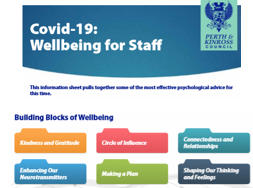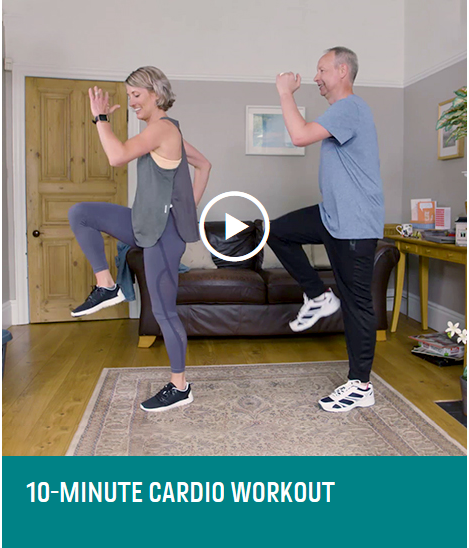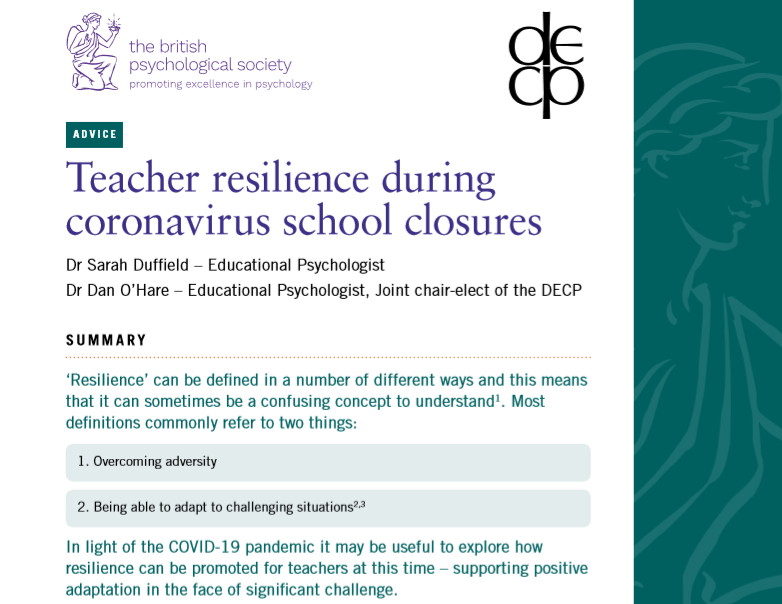From all of our team, we thank you for your efforts.
Welcome to our page for all staff currently working hard during this unpredictable time. You will find some information to help make sure you are taking care of yourself as well as others.
If you are working directly with families and children, please direct them to the information pages on our blog here.
If you are looking for information on supporting loss and breavement, please visit our information page here.
The Educational Psychology Service has produced the Nurturing Wellbeing Framework which consists of key reflective questions and strategies, to be used by our nurseries and schools to support not only children and young people but also staff on their return. The framework can be accessed from here.
1.Taking Care of Yourself
The COVID 19 pandemic has brought about rapid changes for staff working with children and young people. Alongside our children, young people and families, adults, in a wide variety of roles, are adapting to new ways of working and living that may be substantially different to what they are used to. Staff are working hard to think of creative ways to continue to support children and young people’s learning and wellbeing. During this time, it is important to consider our own wellbeing and to be kind to ourselves.
It is important to acknowledge that change is a complex process, which may elicit many feelings all of which are normal. The following change curve shows how we might feel when a significant change in our lives has occurred and the rollercoaster of emotions that can accompany such a change. We are all unique therefore we may feel different emotions and at different times. Our emotions may fluctuate throughout the day or throughout a week and we need to be aware that when a significant change occurs, it is okay to experience a range of feelings, during this time.

In recent weeks, many staff who work regularly in schools such as teachers, support for learning assistants, school administrators, catering and facilities staff, along with other colleagues in education, will have experienced many emotions. They may feel disappointment for joint experiences that will be missed out on or upset that they are not able to see the young people with whom they have a relationship and they may worry about how best to support children and young people, as well as uncertainty about what the future holds.
At the same time, those working with children and young people will experience many changes and emotions within their own personal lives. It is important to be kind to ourselves and patient with ourselves in this period of rapid change and to acknowledge our feelings are valid and normal and will change with time.
During these times, we will be encouraging children, young people and families to find ways to Regulate (think of ways to reduce stress and stay calm) and Relate (keep a sense of connectedness with others) as much as possible. This is important for staff too and here are some ways to do this.
Regulate
1. Keep a clear focus.
Focus on what we can change. When many aspects of life are out with our control, it is important to focus on what we can do and the positive impact we can have.

2. Be realistic.
Be realistic about what we can achieve. During times of rapid change and strong emotions, it is helpful to think of small achievable targets. There can be an urge to respond, make decisions and react as we go through the emotions outlined in the change cycle above; it is important to find ways that help us stay calm and to set realistic and achievable goals, as we would in a normal working day.
3. Follow a routine.
During times of uncertainty, it can be helpful to have a daily schedule to follow. Sticking closely as possible to our usual waking times and working schedules can be good. Also having set work hours (where possible) can help you focus when you need to. It can help set boundaries with others in the household and more importantly, helps you to stop work when your working day is over. Although you are at home, try to keep a work life balance.

4. Take a break.
It is important to take regular breaks and time away from screens when you are working at home. During these breaks try to concentrate on something else, even just for 5 to 10 minutes. This can help us return feeling refreshed and with a different focus. Brain breaks are a strategy that we might use with children and young people however, they are important for us too.
5. Have time outdoors.
Where possible (and following appropriate guidelines) schedule in some time in the fresh air for a walk or run if possible. This will allow us to break up our day and helps to nurture our wellbeing.
6. Regularly exercising.
This is important for wellbeing and linked to the point above. There are many free, online opportunities, to support exercising in the home that are updated daily and could be worth a try. This could be part of your daily routine such as:
Joe Wicks has been showing daily online PE lessons to help keep children fit and healthy during the school shutdown. However, these sessions could be good for any of us! Find an example and his YouTube channel below:
Through their Every Mind Matters page (more info below), the NHS have made a number of different workout videos for you to try. Click below to look:
7. Do something you enjoy.
It is important for our wellbeing to build in times, even if short, for relaxation and enjoyment throughout our days. Continuing to engage in our hobbies can be helpful and it is worth trying to think of all the things we like to do and fit in one per day. Being at home may mean we have to do them differently and be creative but it will be worth it.
Relate
1. Stay connected to friends and family.
Whilst we cannot be physically close to friends and family members, we can remain emotionally connected. Stay connected with friends and family where possible, using methods such as social media, video or voice calls. It is normal to feel isolated during this time but staying in touch can help to support our emotional wellbeing. Knowing you have cheered someone up by staying connected can also make us feel better too.
2. Seek support from colleagues.
Remember that everyone is in the same boat, adapting to new ways of working. Staying connected with colleagues is important to help share positive and negative experiences during this time. Listening to others in a similar situation and helping them, also improves our own wellbeing. It is important to remember to focus on, and be confident, in the targets you have set for yourself and not to be overwhelmed by what others may be doing.
3. Keep others in mind.

Doing something nice for others can also help our wellbeing. Whether that is offering to collect shopping for a neighbour, sending a message to someone you know who might be isolated or vulnerable, or even trying a virtual random act of kindness for someone. Letting others know that you are thinking about them can help boost everyone’s wellbeing.
Other Useful Resources
Having good mental health helps us  relax more, achieve more and enjoy our lives more. Through Every Mind Matters the NHS have provided advice and practical tips to help you look after your mental health and wellbeing, during the current situation.
relax more, achieve more and enjoy our lives more. Through Every Mind Matters the NHS have provided advice and practical tips to help you look after your mental health and wellbeing, during the current situation.
 Perth and Kinross Educational Psychology Service have created an accessible and helpful information sheet focusing on evidence-based suggestions under the themes of building wellbeing. It is definitely worth a look. Click here.
Perth and Kinross Educational Psychology Service have created an accessible and helpful information sheet focusing on evidence-based suggestions under the themes of building wellbeing. It is definitely worth a look. Click here.
The British Psychological Society has provided information to help with teacher resilience during school closures. It explores how resilience can be promoted for teachers at this time by focusing on creating a sense of belonging, help seeking and learning. Find out more by clicking below:
2. Supporting Children, Young People and their Families
We have lots of information on this blog for both children and young people, and their parents/carers. This may be useful for staff to know about or look at when they are in contact with pupils or parents/carers. You will find the information here:
These pages outline many ways to look after wellbeing and to regulate and relate whilst at home.
We also have an Advice Line for Parents/Carers and a Phone Service for young people aged 12 years and over, if you think that talking to someone else might be useful. You can find further information here
3. Frequently Asked Questions (Ask us a Question)
Please refer to our frequently asked questions to find an answer or contact us below with a question and we will do our best to respond by adding it to this section.
Q: I have had some contact with parents who have asked about how much learning they should be doing with their child?
During their time at home, some parents may be trying to introduce learning tasks within their child’s day. This may be tasks that have been provided by their child’s teacher or things from other sources. The most important thing during this time is that the home environment is calm and settled. If, when introducing learning tasks, the environment becomes stressful or unsettled, it is unlikely the child will be able to access learning or that it will be worthwhile at that time. Finding the balance is key, and this will be different for each family. We have some information on our Parent/Carers section within this blog that may be helpful to share, including some videos.
 Ask a question
Ask a question




